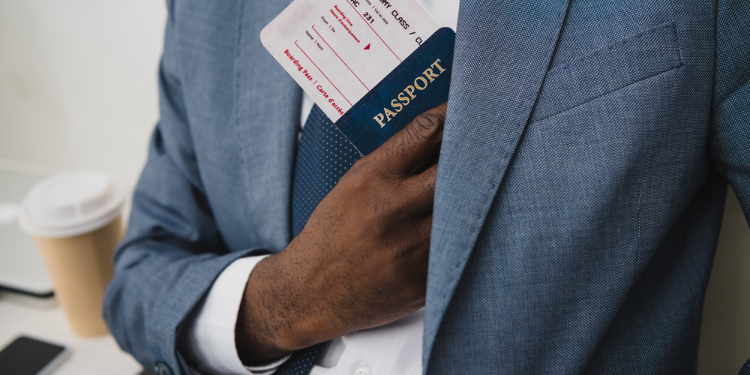
Traveling and moving abroad is the dream of many. Unfortunately, when it comes to passports, not all countries are equal. You must have heard of strong passports and weaker ones. Is there really a geopolitics of visas? How does this affect moving abroad plans?
The strongest passports worldwide
Since 2006, the Henley Passport Index has ranked the strongest passports for travel (those with visa-free access to a large number of countries) and the weakest passports (those with visa-free access to a limited number of countries).
This year, Singapore has the strongest passport for travel, with 192 countries accessible without a visa. Germany, Italy and Spain come in second, with passports offering visa-free access to 190 destinations. Austria, Finland, France, Japan (which loses 1st place), Luxembourg, South Korea and Sweden are in 3rd place. Their passports allow visa-free travel to 189 countries. Denmark, Ireland, the Netherlands and the United Kingdom are 4th, with 188 countries accessible without a visa. Canada ranks 7th and the United States 8th (with 185 and 184 visa-free countries, respectively).
Far behind, Ecuador (58th) offers visa-free access to 92 destinations. It's 88 destinations for Oman (62nd), 80 for Bolivia and China (64th), 63 for Cuba and Rwanda (77th), 50 for Laos (88th), and 38 for Nepal (99th). At the bottom of the list, the Afghan passport (104th) is the weakest, with 27 destinations accessible without a visa. It is followed by Iraq (103rd, 29 visa-free countries), Syria (102nd, 30 countries), Pakistan (101st, 33 countries), Yemen and Somalia (100th, 35 countries).
Passports and visas: Is there a North-South divide?
The Henley Passport Index uses data from the International Air Transport Association (IATA) to compile its ranking (199 passports worldwide). The report's authors believe that travel inequalities have been on the rise since the health crisis. In 2021, when international mobility increased with the reopening of borders, Henley & Partners, the company behind the Henley Passport Index, already noted that the measures taken "to limit the progression of Covid-19 are now being applied to limit mobility in Southern countries.
In the Middle East, the Emirati passport is the highest in the ranking (12th, 179 countries accessible without a visa). In South America, the Chilean passport is the strongest (15th, 174 countries). In Africa, Mauritius has the strongest passport (29th, 148 visa-free destinations). Of course, there are other ranking methods. For example, the Arton Capital study ranks the United Arab Emirates as the country with the strongest passport in 2023.
However, experts agree that the gap between northern and southern countries is widening. For Henley & Partners, the gap between the countries at the top of the ranking and those at the bottom has been widening since 2006. Is the geopolitics of visas creating new inequalities in the world?
How do passport inequalities affect prospective expats?
One could argue that this is just a matter of form. If the country is only accessible with a visa, all you have to do is apply for one. But this is where the problems begin. First, there's the question of money, and the cost of visas can be exorbitant.
Even if you have the money to apply for a visa, the administrative process can be daunting. The host country may ask for any documents it deems necessary, which are sometimes difficult to obtain. For example, some countries require a letter of invitation or a certificate of accommodation with the approval of the administrative services of the country you are visiting (for example, the Direction Départementale de la Surveillance du Territoire). The problem is that these services are far from being known or visible. Some have no website, let alone an email address. Another problem is time. Sometimes, you might have to wait several months to get your visa, even if all your papers are in order.
In a way, the concept of strong and weak passports questions the freedom of movement. Admittedly, freedom of movement is the result of bilateral agreements between states. However, inequality of treatment can still be seen between countries. Reciprocity is not always respected. For example, a citizen of country A may not need a visa to travel to country B, but a citizen of country B may need a visa to travel to country A. In mid-July, Israel announced that American citizens could enter the country without a visa. This measure aimed at joining the U.S. Visa Waiver Program. Israel has been working to join the program for several years. The Israeli government thus hopes to achieve reciprocity.
Conclusion
As we have seen with the Golden Visa, passports and waivers are a matter of geopolitics. States have every interest in reaching agreements with other "partner" states (commercial or diplomatic partners, etc.). For example, the Schengen area is visa-free for most countries except Africa (excluding Mauritius and Seychelles) and Asia (excluding South Korea, Japan, Taiwan, Hong Kong, Malaysia and Israel).
These differences are as many visions of the world, with zones of visa-free movement on the one hand and zones excluded from this freedom of movement on the other. Hence, the notion of inequality between countries. Should the concept of strong and weak passports be questioned (and bilateral agreements reviewed)? The question doesn't arise for countries that aim to strengthen their external borders while facilitating movement within their borders.



















